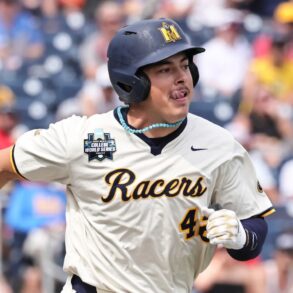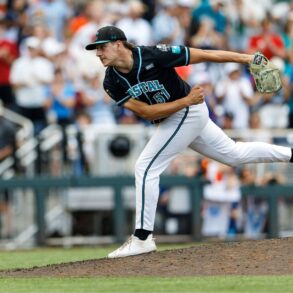OMAHA, Neb. — In summer 2019, Jamie Aloy pulled together enough money to fly himself and his sons to Omaha for the Men’s College World Series. It was a bucket-list trip for Aloy, a former college ballplayer raising a family in Wailuku, Hawai’i.
They stayed in a motel across the river in Council Bluffs, Iowa, and sat in the cheap seats. They went to every game. His boys, Wehiwa, 15, and Kuhio, 13, loved baseball, and Jamie wanted them to “feel and smell” the atmosphere so that it wouldn’t seem so far-fetched to someday play there.
The boys didn’t say much, aside from a few “wows.”
“It’s a culture thing,” Jamie said of their quiet demeanors.
Six years later, on Thursday, Jamie Aloy was at the downtown Omaha Marriott with his grown-up sons. Wehiwa, now 21, and Kuhio, now 19, are star hitters for the No. 3 overall Arkansas Razorbacks, and they were about to play in the Men’s College World Series. Jamie gave them a hug.
“Can you believe we’re here again?” he asked them.
The brothers looked around and didn’t say anything.
“I think they cannot believe it either,” Jamie said. “I mean, what do you say?”
For five months, the Aloys have made plenty of noise in Fayetteville, Arkansas. Wehiwa has hit 20 home runs and earned SEC Player of the Year, and is a finalist for the Golden Spikes Award. Kuhio, who’s 17 months younger, has hit 13 homers and driven in a team-high 70 runs.
Together, they’re known as the “Bash Braddahs.”
The name is in deference to Mark McGwire and Jose Canseco, the slugging duo who led the Oakland A’s to a 1989 World Series title. The Aloys weren’t alive then, of course, but learned about them as kids when they searched, “hardest-hit balls ever in MLB.” They marveled over old videos of the duo, who would bash each other’s forearms in celebration of homers. But the brothers do not exactly carry the towering physical traits of Canseco and McGwire. Wehiwa is 6-foot-2 and 200 pounds; Kuhio is 6-1 and 205.
Wehiwa said they get their strength from lifting a lot of weights and eating a lot of their parents’ cooking. Their parents attribute it to island life — living five minutes from the beach and five minutes from the river, where they’d run, swim, surf and fish.
“We’re just raised differently,” Kuhio said.
Before Jamie Aloy leaves for a trip to Fayetteville, he cooks all of their Hawai’ian favorites — Kalua Pig, Chicken Long Rice and Lomi-Lomi Salmon — and packs them in a cooler.
The Bash Braddahs’ story began in Wailuku, a town of about 16,000 located on Maui Island, with Wehiwa smacking a plastic ball off a tee as a toddler. Soon, the brothers would be playing whiffle ball together, the competitions oftentimes getting chippy. (They still play whiffle ball when they come back home).
They competed in pretty much every sport, but it was clear, early on, that baseball was their love. Jamie Aloy said there were two baseball leagues on the island, and the only real way a player could gauge his talent was to go to the mainland. There were glimpses, like when Wehiwa was 8 and turning double plays and Napua, the Bash Braddahs mom, asked her husband, “Is that normal?”
The boys’ talents became more obvious on all-star teams that competed on the West Coast.
Wehiwa grew six inches in 2020 during the pandemic. Napua, an obstetrics nurse, was the only one who wasn’t on lockdown. The family set up a mini gym in the garage, and all he did was eat, sleep and train every day.
Still, coming out of high school, Wehiwa was an unknown recruit — if he could even be called a recruit. Sacramento State took a chance on him, and Wehiwa slashed .376/427/.622 with 14 home runs and earned freshman All-American honors. That season earned him a spot on a coveted SEC roster at Arkansas, and the shortstop was second-team All-SEC in 2024.
A time zone away in Utah, his little brother was getting noticed, too. Kuhio was recruited as a pitcher at BYU but wound up leading the team with 38 RBIs. He entered the transfer portal after the season, and Arkansas was the first team to call.
Wehiwa said the brothers fought when they were children, but they have matured and are past that. The players got to pick their own roommates, and the Aloy brothers decided to live together, both in Fayetteville and on the road. Their parents were somewhat surprised by that decision.
“I wasn’t so much fearful,” Napua said, “but I was like, ‘Well, how the hell is that gonna work in college when they’re living together?’ Because we lived so remote, we always say, ‘If mom and dad aren’t around, you guys just have each other, so make sure you take care of each other.'”
Because they’re brothers, they can say things to each other that other teammates maybe wouldn’t. They can analyze each others’ games and provide feedback. Wehiwa is a very serious person, Jamie said, while Kuhio is more fun-loving.
They spend most of their time together, be it in practice, on the road or fishing with their teammates. The Razorbacks often talk about how close-knit this group is, and some of that was forged at local ponds where the teammates fish morning and night, usually catching and releasing the fish.
It’s a way to clear their heads, Arkansas infielder Nolan Souza said. They’re private about some of their favorite spots.
But the big takeaway for the Aloy family is this: After all of that time together, and all those years competing against each other, they choose to be together, even in their free time.
The Razorbacks face Murray State on Monday in a MCWS elimination game (2 p.m. ET on ESPN), and the Aloy family doesn’t like to talk about the end. Wehiwa is expected to be a first-round pick in next month’s MLB draft, another milestone that is beyond any of their wildest dreams. The Bash Braddahs’ story, really, started on a minor league field, years before they were born.
Jamie Aloy was a 48th-round pick by the San Francisco Giants in the 1999 draft. He toiled away in their farm system for a couple of years, and, when the dream of making it to the big leagues eventually seemed too far-fetched, he retired from baseball. He went home to Hawai’i and became a schoolteacher, and he never pressured his sons to play his sport or live out his dreams.
He gets choked up when he thinks about how far those teenagers have gone since that trip to Omaha six years ago.
“Somebody told us, or told me, that you could probably make a movie out of this,” he said, “no matter how it turns out.”
Napua, still tired from the emotionally draining loss to LSU on Saturday night, laughed.
She said it would be a short movie.
“No, for real,” he said. “You look at this story, it’s like a Cinderella story for them personally. For all of us, actually.”
This post was originally published on this site be sure to check out more of their content.






